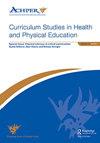Benefits of hybridising the activist approach and teaching games for understanding to empower girls in physical education
IF 2.1
Q2 EDUCATION & EDUCATIONAL RESEARCH
Curriculum Studies in Health and Physical Education
Pub Date : 2023-10-06
DOI:10.1080/25742981.2023.2265351
引用次数: 0
Abstract
ABSTRACTThe aim of this work was to design and implement an effective hybridisation of two pedagogical models that would serve to overcome gender-related barriers to participation in games, based on a co-educational intervention and paying a special attention on the boys’ influence for the girls’ participation. First, we describe the process of creating the hybrid pedagogical model combining the activist approach (Oliver & Kirk [2015]. Girls, gender and physical education: An activist approach. Routledge.) and teaching games for understanding (Bunker & Thorpe [1982]. A model for the teaching of games in secondary schools. Bulletin of Physical Education, 18, 5–8). We then present its 11-week implementation in a physical education class of 20 pupils in the 5th grade of primary school. Finally, we analysed the achievement of the objectives established, whereby the qualitative information gathered from interviews, focus groups, and the participants’ observation diaries, is complemented with the quantitative evaluation of game performance. The whole group worked together to modify our actions, allowing the girls to participate more actively, what reflected a significant improvement of the girls’ involvement in the game.KEYWORDS: Hybridisationactivist approachteaching games for understandinggirls Disclosure statementNo potential conflict of interest was reported by the author(s).Additional informationFundingThis work was supported by Ministerio de Ciencia e Innovación/Agencia Estatal de Investigación/10.13039/501100011033 y los fondos “FEDER Una manera de hacer Europa ”: [grant number PID2021-122886OB-C21].Notes on contributorsMarcos SeldasMarcos Seldas is Associate Professor in physical education pedagogy within the Universidad de Castilla-La Mancha. He specialises in the physical education and vulnerable situations. His current research is looking at using some pedagogical models to improve the situation of various contexts with difficulties.Luis M. García LópezLuis M. García López is Full Professor in physical education pedagogy within the Faculty of Education, University of Castilla-La Mancha. He specialises in research and teaching on topics of sport pedagogy and social justice. Specifically, his line of research has focused on understanding activist and salutogenic approaches within physical education and community programmes.将积极分子方法和教学游戏相结合的好处,以促进理解,使女孩在体育教育中获得权力
摘要本研究的目的是设计和实施一种有效的混合教学模式,以男女同校的干预为基础,特别关注男孩对女孩参与游戏的影响,从而克服与性别有关的参与障碍。首先,我们描述了结合激进主义方法创建混合教学模式的过程(Oliver & Kirk[2015])。女孩、性别和体育教育:一种积极的方法。(邦克和索普[1982])。中学游戏教学的模式。体育通报,18,5-8)。然后,我们在一个小学五年级20名学生的体育课上介绍了其为期11周的实施情况。最后,我们分析了既定目标的实现情况,即从访谈、焦点小组和参与者观察日记中收集的定性信息与对游戏表现的定量评估相辅相成。整个小组共同努力修改我们的行为,让女孩们更积极地参与进来,这反映了女孩们在游戏中的参与度有了显著提高。关键词:杂交、激进主义方法、理解女孩的教学游戏披露声明作者未报告潜在的利益冲突。本研究得到了法国科学部Innovación/阿根廷国家开发署Investigación/10.13039/501100011033的支持,项目编号:PID2021-122886OB-C21。作者简介:马科斯·塞尔达斯,卡斯蒂利亚-拉曼查大学体育教育学副教授。他的专长是体育教育和弱势群体。他目前的研究是利用一些教学模式来改善各种困难环境的情况。Luis M. García LópezLuis M. García López,西班牙卡斯蒂利亚-拉曼查大学教育学院体育教育学正教授。他专注于体育教育学和社会正义的研究和教学。具体来说,他的研究重点是了解体育教育和社区项目中的积极分子和健康方法。
本文章由计算机程序翻译,如有差异,请以英文原文为准。
求助全文
约1分钟内获得全文
求助全文
来源期刊

Curriculum Studies in Health and Physical Education
Social Sciences-Education
CiteScore
3.00
自引率
10.50%
发文量
33
 求助内容:
求助内容: 应助结果提醒方式:
应助结果提醒方式:


